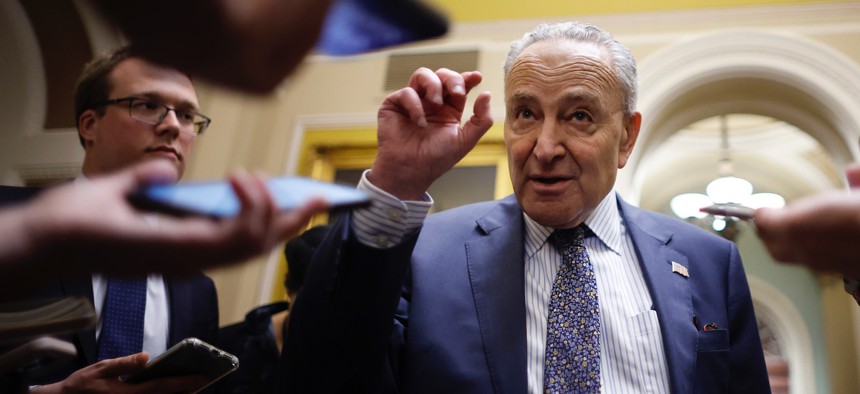
Senate Majority Leader Charles Schumer, D-NY, said Thursday that the funding minibus required bipartisan cooperation. Chip Somodevilla / Getty Images
Congress averts shutdown, locks in some agency cuts as Senate backs funding package
Lawmakers now face a March 22 shutdown deadline for the rest of government.
The Senate on Friday approved a funding package to set spending levels for some agencies for the rest of fiscal 2024, sending the measure to the president just hours before a partial shutdown was set to begin.
The $460 billion “minibus” — which contains funding for the departments of Agriculture, Energy, Housing and Urban Development, Transportation, Veterans Affairs, Interior, Commerce and Justice, as well as the Environmental Protection Agency and some other agencies — will now become law after the House passed it earlier this week. The measures will force many agencies across government to absorb modest cuts relative to their current funding levels, though overall non-defense discretionary spending will remain flat.
The Senate had to manage its typical high-wire act ahead of its vote, with Republicans demanding action on a series of doomed amendments. Senate Majority Leader Chuck Schumer, D-N.Y., cautioned on Thursday the final procedural steps still remained an open question.
“We’re close to the finish line, but it will take bipartisan cooperation to get us there,” Schumer said.
Appropriators now face a March 22 deadline as they turn their attention to the second package featuring six of the 12 annual spending bills Congress must pass each year. House Republicans touted that in the first package they achieved cuts across agencies including EPA, FBI and Bureau of Alcohol, Tobacco, Firearms and Explosives, though after accounting for one-off projects in fiscal 2023 and supplemental funding through previously passed laws the reductions are not as significant as initially advertised.
They have noted they did not include increased spending for federal employee salaries for the current fiscal year, despite President Biden authorizing a 5.2% pay bump that went into effect Jan. 1. That will require agencies to absorb those personnel costs elsewhere in their budgets, they said.
Democrats have boasted that they staved off the larger cuts Republicans had sought and secured funding for key priorities, including hiring air traffic controllers at the Federal Aviation Administration, maintaining pay raises for federal firefighters and adding mental health care professionals at the Veterans Affairs Department.
“We successfully defeated the vast majority of the extreme cuts and hundreds of harmful policy riders proposed by the House Republicans,” House Appropriations Committee Ranking Member Rosa DeLauro, D-Conn., said on Wednesday. “We rejected their attempts to defund critical agencies and programs and we rejected their culture war riders.”
DeLauro said she was hopeful appropriators would meet the deadline for the second minibus, which will include potentially thornier parts of the government such as the Homeland Security Department.
“We are on target and on track to meet that deadline of March 22,” DeLauro said. “We are not going to be shutting government down.”
Schumer was similarly optimistic, though he cautioned partisan differences could still derail progress.
“Passing these bills will give us much-needed momentum to finish the next package of spending bills by the March 22 deadline,” Schumer said. “But as I’ve said repeatedly, it will take bipartisan cooperation to finish the job.”
Congressional leaders previously agreed to a top-line spending level of $1.66 trillion for fiscal 2024. Overall, defense spending is set to jump 3% to $886 billion and non-defense spending will stay essentially flat relative to fiscal 2023 at nearly $773 billion.







